Related Research Articles

Benjamin Disraeli, 1st Earl of Beaconsfield, was a British statesman and Conservative politician who twice served as Prime Minister of the United Kingdom. He played a central role in the creation of the modern Conservative Party, defining its policies and its broad outreach. Disraeli is remembered for his influential voice in world affairs, his political battles with the Liberal Party leader William Ewart Gladstone, and his one-nation conservatism or "Tory democracy". He made the Conservatives the party most identified with the British Empire, and military action to expand it, both of which were popular among British voters. He is the only British prime minister to have been of Jewish origin. He was also a novelist, publishing works of fiction even as prime minister.
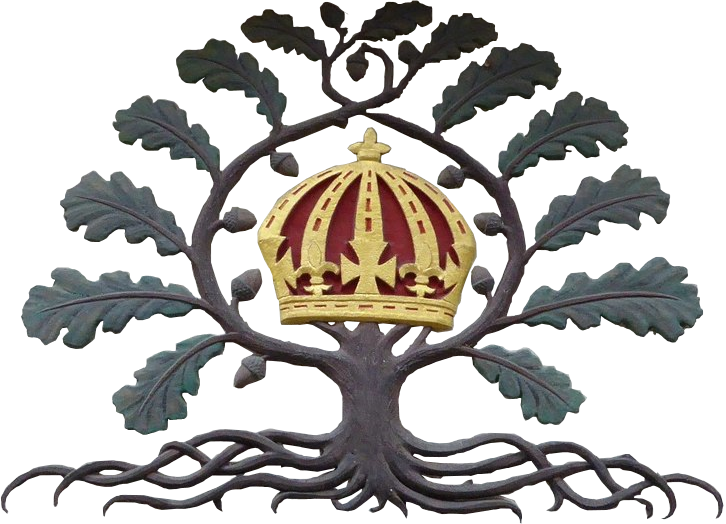
A Tory is a person who holds a political philosophy known as Toryism, based on a British version of traditionalism and conservatism, which upholds the supremacy of social order as it has evolved in the English culture throughout history. The Tory ethos has been summed up with the phrase "God, Queen, and Country". Tories are generally monarchists, were historically of a high church Anglican religious heritage, and opposed to the liberalism of the Whig faction. Typically, Tories defend the ideas of hierarchy, natural order, and aristocracy.
The Whigs were a political faction and then a political party in the Parliaments of England, Scotland, Ireland, Great Britain and the United Kingdom. Between the 1680s and the 1850s, the Whigs contested power with their rivals, the Tories. The Whigs merged into the new Liberal Party in the 1850s, and other Whigs left the Liberal Party in 1886 to form the Liberal Unionist Party, which merged into the Liberals' rival, the modern day Conservative Party, in 1912.

Anne was Queen of England, Scotland and Ireland from 8 March 1702. On 1 May 1707, under the Acts of Union, the kingdoms of England and Scotland united as a single sovereign state known as Great Britain. Anne continued to reign as Queen of Great Britain and Ireland until her death in 1714.

General John Churchill, 1st Duke of Marlborough, 1st Prince of Mindelheim, 1st Count of Nellenburg, Prince of the Holy Roman Empire, was an English soldier and statesman whose career spanned the reigns of five monarchs. From a gentry family, he served first as a page at the court of the House of Stuart under James, Duke of York, through the 1670s and early 1680s, earning military and political advancement through his courage and diplomatic skill.
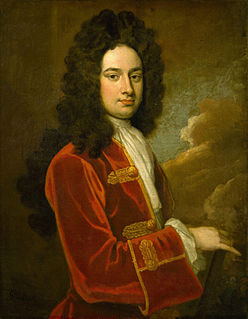
James Stanhope, 1st Earl Stanhope was a British soldier, diplomat and statesman who effectively served as Chief Minister between 1717 and 1721.
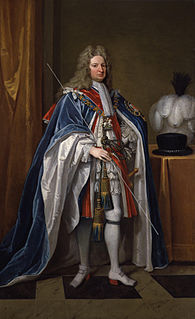
Robert Harley, 1st Earl of Oxford and Earl Mortimer, KG PC FRS was an English and later British statesman of the late Stuart and early Georgian periods. He began his career as a Whig, before defecting to a new Tory ministry. He was raised to the peerage of Great Britain as an earl in 1711. Between 1711 and 1714 he served as Lord High Treasurer, effectively Queen Anne's chief minister. He has been called a prime minister, although it is generally accepted that the de facto first minister to be a prime minister was Robert Walpole in 1721.

The Tories were a loosely organised political faction and later a political party, in the Parliaments of England, Scotland, Ireland, Great Britain and the United Kingdom. They first emerged during the 1679 Exclusion Crisis, when they opposed Whig efforts to exclude James, Duke of York from the succession on the grounds of his Catholicism. Despite their fervent opposition to state-sponsored Catholicism, Tories opposed exclusion in the belief inheritance based on birth was the foundation of a stable society.
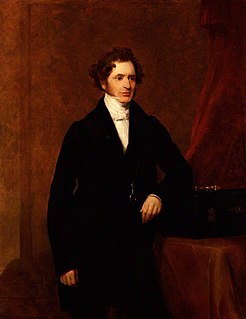
The 1852 United Kingdom general election was a watershed in the formation of the modern political parties of Britain. Following 1852, the Tory/Conservative party became, more completely, the party of the rural aristocracy, while the Whig/Liberal party became the party of the rising urban bourgeoisie in Britain. The results of the election were extremely close in terms of the numbers of seats won by the two main parties.

In the 1841 United Kingdom general election, there was a big swing as Sir Robert Peel's Conservatives took control of the House of Commons. Melbourne's Whigs had seen their support in the Commons erode over the previous years. Whilst Melbourne enjoyed the firm support of the young Queen Victoria, his ministry had seen increasing defeats in the Commons, culminating in the defeat of the government's budget in May 1841 by 36 votes, and by 1 vote in a 4 June 1841 vote of no confidence put forward by Peel. According to precedent, Melbourne's defeat required his resignation. However, the cabinet decided to ask for a dissolution, which was opposed by Melbourne personally, but he came to accept the wishes of the ministers. Melbourne requested the Queen dissolve Parliament, leading to an election. The Queen thus prorogued Parliament on 22 June.

The Occasional Conformity Act, also known as the Occasional Conformity Act 1711 or the Toleration Act 1711) was an Act of the Parliament of Great Britain which passed on 20 December 1711. Previous Occasional Conformity bills had been debated in 1702 and 1704, the latter causing the 'Tackers' controversy. It was passed by the Tories to undermine the Whig party, and to ensure that elections to Parliament were under the control of Tories, with non-conformists locked out. It applied to any national or local official in England or Wales who was required to attend Church of England services and take the Lord's Supper. If such a person attended "any conventicle, assembly or meeting" of any other religion, they would be subject to a penalty of £40 and permanently barred from government employment.

The first Parliament of the Kingdom of Great Britain was established in 1707 after the merger of the Kingdom of England and the Kingdom of Scotland. It was in fact the 4th and last session of the 2nd Parliament of Queen Anne suitably renamed: no fresh elections were held in England, and the existing members of the House of Commons of England sat as members of the new House of Commons of Great Britain. In Scotland, prior to the union coming into effect, the Scottish Parliament appointed sixteen peers and 45 Members of Parliaments to join their English counterparts at Westminster.
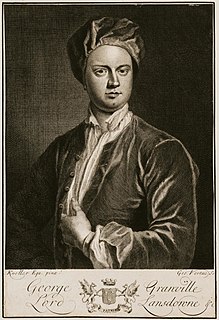
George Granville, 1st Baron Lansdowne PC, of Stowe, Cornwall, was an English Tory politician who sat in the English and British House of Commons from 1702 until 1712, when he was raised to the peerage as Baron Lansdown and sat in the House of Lords. He was Secretary at War during the Harley administration from 1710 to 1712. He was also a noted poet and made a name for himself with verses composed on the visit of Mary of Modena, then Duchess of York, while he was at Cambridge in 1677. He was also a playwright, following in the style of John Dryden.
Sir Walter Clarges, 1st Baronet was an English Tory politician who served four separate terms in Parliament. An early ally of William of Orange, he inherited large holdings of land but no great ability from his father, Sir Thomas Clarges, and largely used his Parliamentary seat to advance his own business and financial interests.
During the early 18th century Great Britain was undergoing a government shift into a two party system. The prior conservative party, the Tories, was the primary political party, but at the turn of the 18th century the Whigs, a liberal faction, had begun to rise in influence. As the parties struggled for power in Parliament, tensions rose. When the Whig party continued to grow in power and influence, gaining more representation in Parliament and recognition in the general public, the Tories, found themselves challenged over their policies and opinions. The arguments of government went beyond the House of Parliament. Public speeches, debates, and other forms of popular influence arose, creating a new style of politics. This was the environment that Princess Anne found herself when she became Queen of England, Scotland, and Ireland on March 8, 1702. Her brother-in-law, William III of England and II of Scotland who had preceded her had been in support of the growing two party system, and in respect, Anne "endured" the Whigs despite her alliance with the Tory party. The tensions between the parties had escalated to the point where party members became paranoid of conspiracies and conducted plots against one another. The Whigs conspired assassination plots against important Tory figures as an attempt to make way for their policies and political agendas.
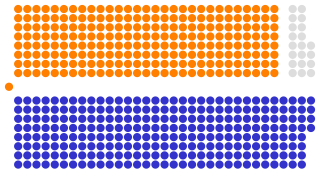
The 1705 English general election saw contests in 110 constituencies in England and Wales, roughly 41% of the total. The election was fiercely fought, with mob violence and cries of "Church in Danger" occurring in several boroughs. During the previous session of Parliament the Tories had become increasingly unpopular, and their position was therefore somewhat weakened by the election, particularly by the Tackers controversy. Due to the uncertain loyalty of a group of 'moderate' Tories led by Robert Harley, the parties were roughly balanced in the House of Commons following the election, encouraging the Whigs to demand a greater share in the government led by Marlborough

In the spring and summer of 1715 a series of riots occurred in England in which High Church mobs attacked over forty Dissenting meeting-houses. The rioters also protested against the first Hanoverian king of Britain, George I and his new Whig government. The riots occurred on symbolic days: 28 May was George I's birthday, 29 May was the anniversary of Charles II's Restoration and 10 June was the birthday of the Jacobite Pretender, James Francis Edward Stuart.
'Church in Danger' was a political slogan used by the Tory party, and particularly by High Tories in elections during Queen Anne's reign.

The 2nd Parliament of King William III and Queen Mary II was summoned by William III of England and Mary II of England on 6 February 1690 and assembled on 20 March 1690.

The 3rd Parliament of Great Britain was summoned by Queen Anne on 27 September 1710 and assembled on the 25 November 1710. Under the Triennial Act, the Parliament was due to expire, if not dissolved sooner, at the end of the term of three years from the first meeting. In the event it was actually dissolved on 8 August 1713.